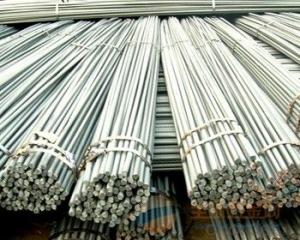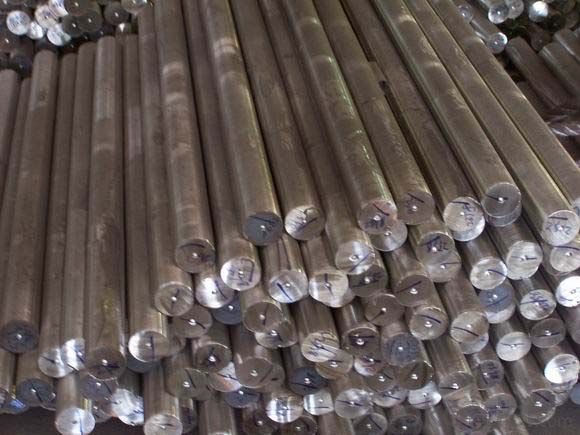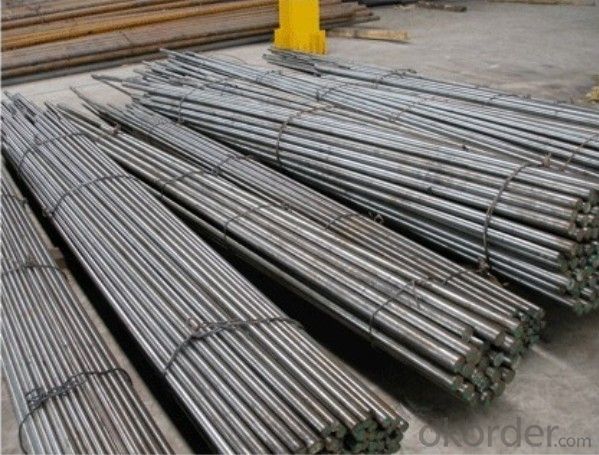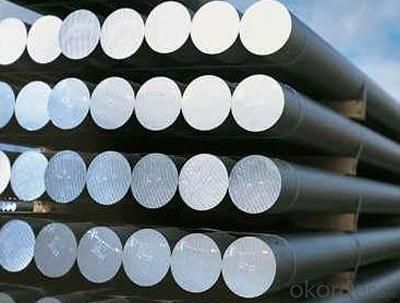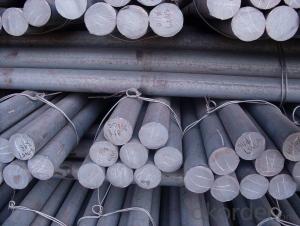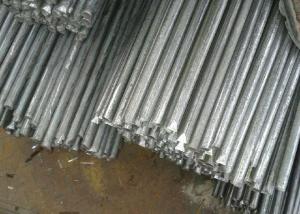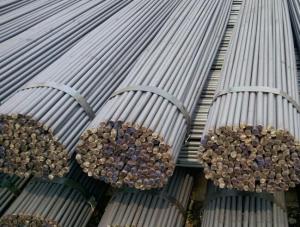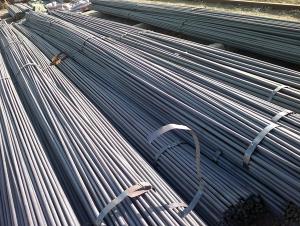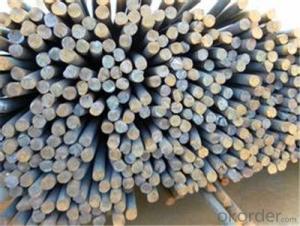good quality round steel bar for construction
- Loading Port:
- Tianjin
- Payment Terms:
- TT OR LC
- Min Order Qty:
- 25000 m.t.
- Supply Capability:
- 10000 m.t./month
OKorder Service Pledge
OKorder Financial Service
You Might Also Like
Specifications of Round Bar
1. Grade: Q195, Q235, Q345
2. Diameter: 6mm-150mm
3. Length: 6m, 9m, 12m or as customer’s request
4. Tolerance: Within ±5% for weight; ±2mm for diameter
5. Note: The price can be better is the quantity is good
6. Chemical composition
Alloy No | Element (%) | ||||
C | Mn | S | P | Si | |
Q195 | 0.06-0.12 | 0.25 | ≤0.05 | ≤0.045 | ≤0.3 |
Q235 | 0.12—0.20 | 0.3—0.7 | ≤0.045 | ≤0.045 | ≤0.3 |
Q345 | ≤0.2 | 1.00-1.60 | ≤0.045 | ≤0.045 | ≤0.55 |
Usage and Applications of Round Bar
1. Chinese standard steel bar is often used where large amounts of steel need to be formed, for example as structural steel.
2. And we can use this kind of product on the performance of the mechanical parts if the demand is not very high.
3. Steel round bar is used in construction and a large number of architectural and engineering structures.
Packaging & Delivery of Round Steel Spring Bar:
-Packing Detail: The products can be packed in bundles by steel wires.
-Delivery Detail:
1, Delivery time: 30~45 working days after receive buyer’s T.T. or L/C.
2, Delivery status should be written in the contract. (Heat treatment or no)
Payment:
-Invoicing on theoretical weight or actual weight as customer’s request.
-FOB, CFR or CIF.
-Regular terms of payment:
1, 30% payment in advance, the remaining balance (70% payment) against the copy of B/L. 100% payment before shipment.
2, 30% payment in advance, the remaining balance (70% L/C) against the copy of B/L. 100% payment before shipment.
3, Negotiable.
Photos of Round Steel Spring Bar:
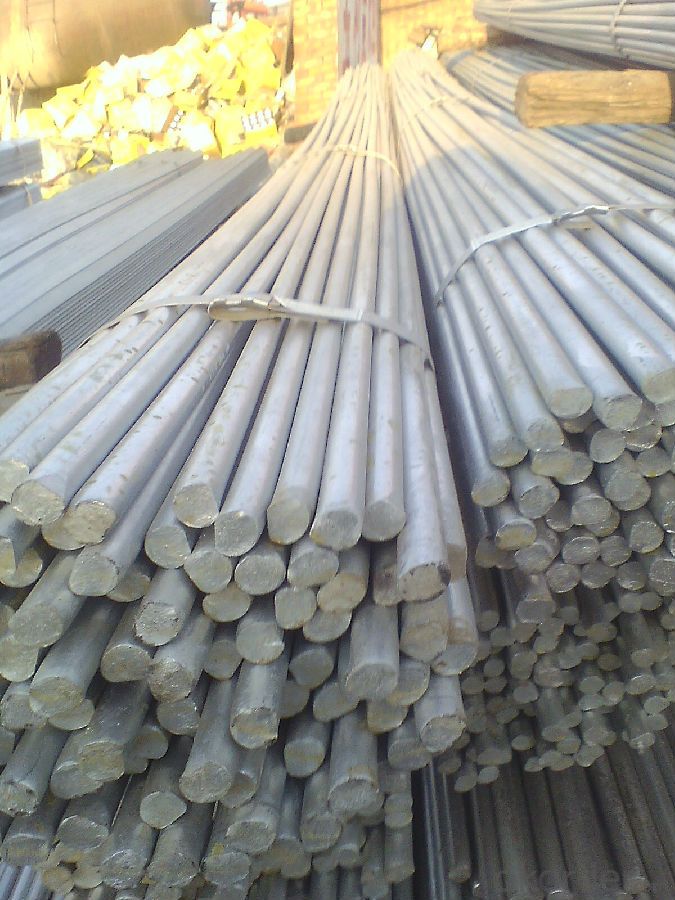
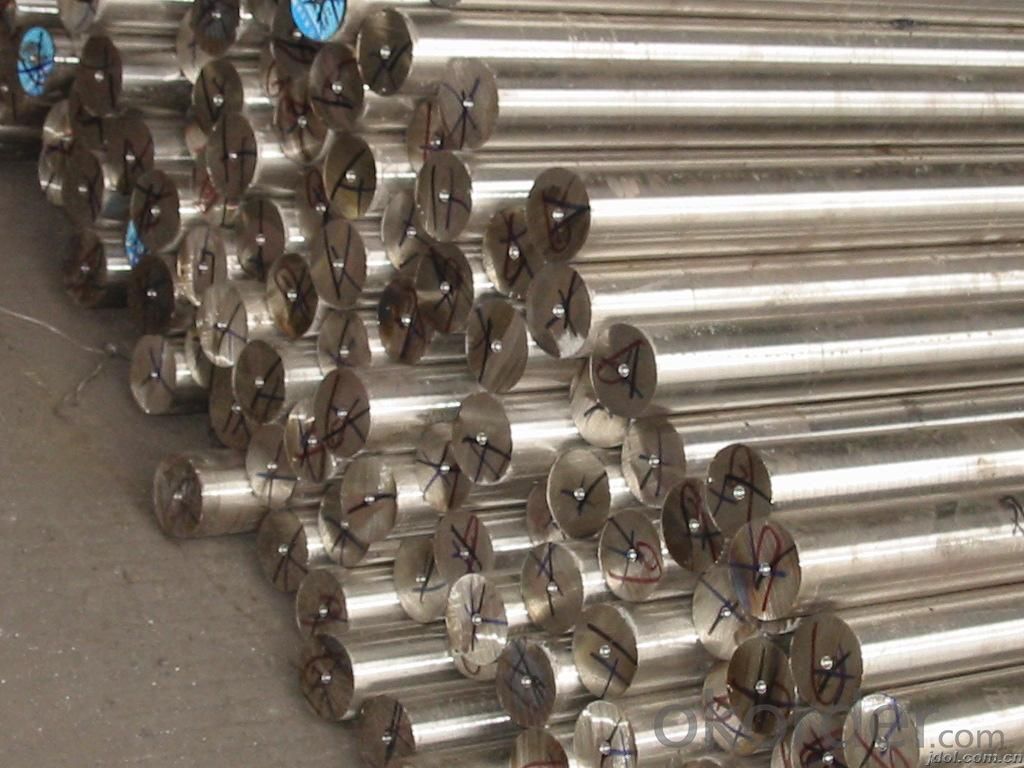
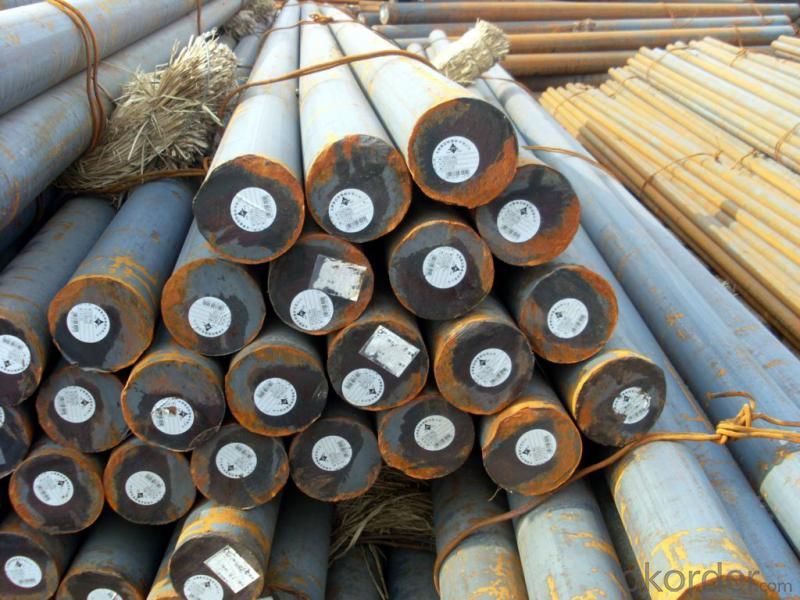
- Q: How do you store steel round bars to prevent damage?
- To prevent damage to steel round bars, they should be stored in a clean and dry environment, away from moisture and direct sunlight. It is recommended to store them horizontally on a flat surface or on racks, ensuring they are not stacked too high to avoid bending or warping. Additionally, using protective coverings or plastic caps on the ends can help prevent any potential scratches or dents during storage.
- Q: Can steel round bars be used for making agricultural equipment or machinery?
- Agricultural equipment and machinery can indeed be made using steel round bars. Steel, a material known for its versatility and durability, is commonly employed in the manufacturing of various agricultural equipment and machinery. Steel round bars, specifically, are frequently utilized for the creation of essential components like shafts, axles, and rods, which are vital for the proper functioning of agricultural machinery. These round bars offer strength, stability, and resistance to wear and tear, making them well-suited for the demanding tasks within the agricultural industry. Moreover, steel is highly resistant to corrosion, a particularly crucial characteristic in agriculture where equipment is exposed to harsh environmental conditions. Overall, steel round bars are a dependable option for constructing agricultural equipment or machinery due to their mechanical properties and ability to endure the challenging conditions of agricultural operations.
- Q: What are the advantages of using low-alloy steel round bars?
- Low-alloy steel round bars have become popular in various industries due to several advantages they offer. Firstly, they provide greater strength and durability compared to regular carbon steel, making them suitable for applications requiring high strength and resistance to wear and tear. The addition of alloying elements like manganese, chromium, and nickel enhances the hardness and toughness of the steel, ensuring its reliability and long-lasting nature. Secondly, low-alloy steel round bars exhibit excellent weldability and machinability. The presence of alloying elements allows for better control over the grain structure, resulting in improved weldability. This means that these bars can be easily welded and fabricated into complex shapes without compromising their structural integrity. Additionally, their machinability enables efficient processing and customization according to specific requirements. Furthermore, low-alloy steel round bars offer enhanced resistance to corrosion and atmospheric conditions. The alloying elements create a protective oxide layer on the surface, preventing rusting and deterioration over time. This makes them ideal for outdoor applications in harsh environments, such as construction, marine, and oil and gas industries. Moreover, low-alloy steel round bars are a cost-effective alternative to higher-alloy or stainless steel options. While providing similar strength and performance, low-alloy steel is generally more affordable, making it a viable option for projects with budget constraints. This cost-effectiveness, combined with their durability and versatility, makes low-alloy steel round bars a preferred choice for a wide range of applications. In conclusion, the advantages of low-alloy steel round bars include increased strength and durability, excellent weldability and machinability, resistance to corrosion, and cost-effectiveness. These properties make them a reliable and versatile material for various industries, contributing to their widespread use in numerous applications.
- Q: What is the difference between a centerless ground and a precision ground steel round bar?
- A centerless ground steel round bar is manufactured by grinding the outer diameter of the bar using a centerless grinding machine. This process ensures that the bar has a consistent diameter throughout its length, with tight tolerances for dimensional accuracy. On the other hand, a precision ground steel round bar is typically manufactured using a different grinding method where the bar is held between centers and ground to achieve precise dimensions and surface finish. This process allows for even tighter tolerances and finer surface finishes than centerless grinding. In summary, while both centerless ground and precision ground steel round bars offer dimensional accuracy, the precision ground bar provides even tighter tolerances and superior surface finish due to the use of a different grinding method.
- Q: Can steel round bars be used for making transmission components?
- Yes, steel round bars can be used for making transmission components. Steel is a widely used material in the manufacturing industry, and it offers excellent strength, durability, and resistance to wear and tear. Round bars made of steel are commonly used in the production of transmission components such as gears, shafts, and couplings. The steel round bars are often machined or forged into the desired shape and then heat-treated to enhance their mechanical properties. The use of steel round bars ensures that the transmission components can withstand high loads, provide smooth power transmission, and have a long service life.
- Q: Can steel round bars be used in corrosive environments?
- Steel round bars can be used in corrosive environments, but their suitability depends on the specific type of steel and the severity of the corrosion. Stainless steel round bars, for example, are known for their excellent corrosion resistance and are commonly used in corrosive environments such as marine applications, chemical processing plants, and wastewater treatment facilities. These bars are typically alloyed with elements like chromium and nickel, which form a protective layer on the steel surface, preventing corrosion. However, carbon steel round bars are more prone to corrosion and may not be suitable for highly corrosive environments without proper coatings or treatments. In such cases, it is important to consult with experts or engineers to select the appropriate steel grade and take necessary precautions to ensure the longevity and performance of steel round bars in corrosive environments.
- Q: Can steel round bars be used for making jewelry?
- Yes, steel round bars can be used for making jewelry. While steel is not as commonly used for jewelry making as precious metals like gold or silver, it can still be a viable option for certain types of jewelry. Steel round bars are often used in industrial or modern jewelry designs, as they provide a sleek and contemporary look. Additionally, steel is highly durable, resistant to tarnish, and more affordable compared to other metals, making it suitable for those looking for a more budget-friendly option. However, it is important to note that steel can be heavier than other metals, so it may not be suitable for delicate or intricate jewelry designs. Furthermore, steel may cause skin reactions in individuals with metal allergies, so it is advisable to take precautions and ensure the steel used is hypoallergenic or coated with a protective layer. Ultimately, the choice to use steel round bars for making jewelry depends on the desired style, durability, and budget of the individual creating or purchasing the jewelry.
- Q: What are the different types of steel round bar surface treatments used in the automotive industry?
- In the automotive industry, there are several types of steel round bar surface treatments used to enhance the performance, durability, and aesthetics of the components. Some of the common surface treatments include: 1. Phosphating: Phosphating is a widely used surface treatment that involves applying a phosphate coating on the steel round bar. This treatment enhances corrosion resistance and provides a good base for further coatings or paints. 2. Galvanizing: Galvanizing involves applying a layer of zinc to the steel round bar's surface. This treatment provides excellent corrosion resistance and enhances the lifespan of the component. 3. Electroplating: Electroplating is a process where a thin layer of metal, such as chrome or nickel, is deposited onto the steel round bar's surface using an electric current. This treatment improves the appearance, provides corrosion resistance, and enhances wear resistance. 4. Powder coating: Powder coating is a popular surface treatment method where a dry powder is applied to the steel round bar's surface and then heated to form a protective coating. This treatment provides excellent durability, corrosion resistance, and can be customized with various colors and finishes. 5. Anodizing: Anodizing is typically used for aluminum components in the automotive industry. However, it can also be applied to steel round bars in certain cases. This treatment involves creating an oxide layer on the surface, providing improved corrosion resistance and enhancing the appearance. 6. Black oxide coating: Black oxide coating is a chemical treatment that creates a blackened surface on the steel round bar. This treatment provides corrosion resistance, improved aesthetics, and can also act as a lubricant in certain applications. It is important to note that the choice of surface treatment depends on the specific requirements of the automotive component, including environmental conditions, desired appearance, and functional properties. Manufacturers carefully select the appropriate treatment to ensure optimal performance and longevity of the steel round bar in the automotive industry.
- Q: What are the different types of steel round bars used in the automotive drivetrain systems?
- There are several types of steel round bars commonly used in automotive drivetrain systems, including alloy steel, carbon steel, and stainless steel. These bars are chosen based on their specific properties and characteristics, such as strength, durability, and resistance to corrosion. The selection of the type of steel round bar depends on the specific application and requirements of the drivetrain system.
- Q: What are the different types of steel round bar alloys for improved toughness and wear resistance?
- Improved toughness and wear resistance are key characteristics in several steel round bar alloys. These alloys are essential in applications where strength and durability are necessary. Some of the commonly utilized alloys are: 1. Alloy Steel: By incorporating elements like chromium, nickel, molybdenum, or vanadium, alloy steel round bars are fabricated to enhance their mechanical properties. These alloys provide increased strength, toughness, and wear resistance. 2. Stainless Steel: With a minimum chromium content of 10.5%, stainless steel round bars are corrosion-resistant alloys. They exhibit excellent toughness, high strength, and superior wear resistance. Industries such as aerospace, automotive, and construction widely rely on stainless steel round bars. 3. Tool Steel: Tool steel round bars are tailor-made for applications that demand high wear resistance and toughness. These alloys are commonly employed in the manufacturing of cutting tools, dies, and molds. By incorporating elements like tungsten, vanadium, or molybdenum, tool steel alloys improve hardness and wear resistance. 4. Carbon Steel: Renowned for their high strength and toughness, carbon steel round bars find extensive use. These alloys contain varying amounts of carbon and are recognized for their excellent wear resistance. Industries including manufacturing, construction, and automotive utilize carbon steel round bars. 5. Bearing Steel: Bearing steel round bars are specifically engineered to withstand high stress and offer excellent wear resistance. These alloys are commonly employed in the production of ball bearings, roller bearings, and other high-performance bearing components. Bearing steel alloys typically include elements like chromium, silicon, and manganese to enhance mechanical properties. To conclude, a range of steel round bar alloys is available, each offering improved toughness and wear resistance. The selection of the most suitable alloy depends on specific application requirements and desired mechanical properties.
Send your message to us
good quality round steel bar for construction
- Loading Port:
- Tianjin
- Payment Terms:
- TT OR LC
- Min Order Qty:
- 25000 m.t.
- Supply Capability:
- 10000 m.t./month
OKorder Service Pledge
OKorder Financial Service
Similar products
Hot products
Hot Searches
Related keywords
